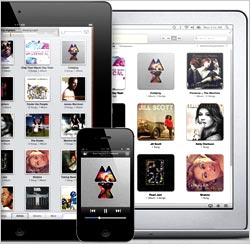Commentary
iTunes Match Starts Paying Off For Copyright Holders
- by Steve Smith , Staff Writer @popeyesm, February 10, 2012
 While many artists have been rebelling against the penny ante royalties they are realizing from music-streaming services, at least one company is
crowing that the alternative Apple iTunes Match service is delivering real revenue. The music distribution service TuneCore posted at its blog earlier this week news that it had received a check from Apple -- $10,000 for two months of
royalties on songs that likely had already been sold to the consumer.
While many artists have been rebelling against the penny ante royalties they are realizing from music-streaming services, at least one company is
crowing that the alternative Apple iTunes Match service is delivering real revenue. The music distribution service TuneCore posted at its blog earlier this week news that it had received a check from Apple -- $10,000 for two months of
royalties on songs that likely had already been sold to the consumer.
Apparently, out of that $25 annual fee for accessing the iTunes Match service, fees are paid to copyright holders whose work is re-downloaded or streamed by the user to one of their devices or PCs.
The Apple iTunes Match service was introduced last year as a kind of locker system for customers. iTunes maintains in its cloud its own copy of the music in your local iTunes library. If the track is not one that you bought from iTunes, the Match service finds and uses its own copy of the track. Users on devices then can access all of their music.
In the Apple model, however, you can stream music from this cloud onto your desktop, but on devices the tracks get downloaded. Regardless, when you download or stream the track, Apple is giving the rights owner a fee.
TuneCore’s Jeff Price calls it "'found money" and explains the subtle difference between getting paid and not getting paid in this system.
“A person has a song on her computer hard drive. She clicks on the song and plays it. No one is getting paid. The same person pays iTunes $25 for iTunes Match. She now clicks on the same song and plays it through her iMatch service [iTunes Match]. Copyright holders get paid. Same action, same song -- one makes money for the copyright holder, and one does not.”
Price is unconcerned about the relative pittance per track the scheme generates because “before you were getting zero -- now you are getting something.”
Whatever deal Apple cut with the copyright holders regarding iTunes, Match appears to have helped them skirt complaints made with Amazon and Google’s locker system, in which users actually upload their tracks to the cloud. While both models accommodate pirated tracks in people’s collections, the Apple Match model at least finds a way to give the rights holder of pirated tracks some compensation they otherwise would not have received.



